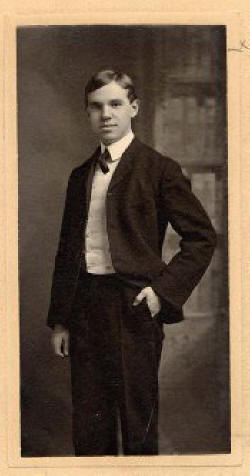

Queer Places:
Stern Conservatory, Hardenbergstraße 33, 10623 Berlin, Germania
Hackley School, 293 Benedict Ave, Tarrytown, NY 10591, Stati Uniti
12 W 46th St, New York, NY 10036, Stati Uniti
Night Hotel (formerly Hotel Longacre), 169 W 47th St, New York, NY 10036, Stati Uniti
Lafayette Baths, 18 Lafayette Pl, Woodmere, NY 11598, Stati Uniti
Produce Exchange Baths, 4-12 Broadway, New York, NY 10004, Stati Uniti
Bloomfield Cemetery, 383 Belleville Ave, Bloomfield, NJ 07003,2603, Stati Uniti
 Charles Tomlinson Griffes (September 17,
1884 – April 8, 1920) was an American
composer
for piano,
chamber ensembles and
voice. Charles Tomlinson Griffes, a modernist composer of the early twentieth
century, had a thing for Irish policemen. In the 1910s he recorded in his
diary his approaches and progress: “I talked for about 20 minutes with the
policeman stationed at 42–5 in the evenings. He remembers me this time and was
so responsive I asked him to go to the theater with me.”
Charles Tomlinson Griffes (September 17,
1884 – April 8, 1920) was an American
composer
for piano,
chamber ensembles and
voice. Charles Tomlinson Griffes, a modernist composer of the early twentieth
century, had a thing for Irish policemen. In the 1910s he recorded in his
diary his approaches and progress: “I talked for about 20 minutes with the
policeman stationed at 42–5 in the evenings. He remembers me this time and was
so responsive I asked him to go to the theater with me.”
Griffes was born in Elmira, New York. After early studies on piano and organ in his home town, he went to Berlin to study with pianist Ernst Jedliczka at the Stern Conservatory.[2] While there, Griffes also enjoyed a brief but influential mentorship by composer Engelbert Humperdinck.[2] On returning to the U.S. in 1907, he became director of music studies at the Hackley School for boys in Tarrytown, New York, a post which he held until his early death thirteen years later.[3]
Griffes is the most famous American representative of musical Impressionism. He was fascinated by the exotic, mysterious sound of the French Impressionists, and was compositionally much influenced by them while he was in Europe. He also studied the work of contemporary Russian composers (for example Scriabin), whose influence is also apparent in his work, for example in his use of synthetic scales.
His most famous works are the White Peacock, for piano (1915, orchestrated in 1919); his Piano Sonata (1917–18, revised 1919); a tone poem, The Pleasure Dome of Kubla Khan, after the fragment by Coleridge (1912, revised in 1916), and Poem for Flute and Orchestra (1918). He also wrote numerous programmatic pieces for piano, chamber ensembles, and for voice. The amount and quality of his music is impressive considering his short life and his full-time teaching job, and much of his music is still performed. His unpublished Sho-jo (1917), a one-act pantomimic drama based on Japanese themes, is one of the earliest works by an American composer to show direct inspiration from the music of Japan.
During his time as a student in Berlin he was devoted to his "special friend", fellow student and German nationalist-composer Emil Joèl (aka "Konrad Wölcke"), who helped Griffes through the financially troubled times following his father death in 1905. Charles Griffes self-avowed homosexual chronicled his openly homosexual lifestyle in dairies. In later life, he had a long term relationship with John Meyer (biographer Edward Maisel used the pseudonym Dan C. Martin), a married New York policeman.
Griffes died of influenza in New York City during the worldwide pandemic at the age of 35 and is buried in Bloomfield Cemetery in Bloomfield, Essex County, New Jersey.[4] His papers passed to his younger sister Marguerite who chose to destroy many that explicitly related to his gay life.[5] Donna Anderson is his current literary executor.
Griffes kept meticulous diaries, some in German, which chronicled his musical accomplishments from 1907 to 1919, and also dealt honestly with his homosexuality, including his regular patronage of the Lafayette Place Baths and the Produce Exchange Baths. [4][6]
Charles Tomlinson Griffes was drawn into the gay world by the baths not just because he had sex there, but because he met men there who helped him find apartments and otherwise make his way through the city, who appreciated his music, who gave him new insights into his character, and who became his good friends. The gay world became a central part of his everyday world, even though he kept it hidden from his nongay associates. - George Chauncey, Gay New York 1995
My published books: